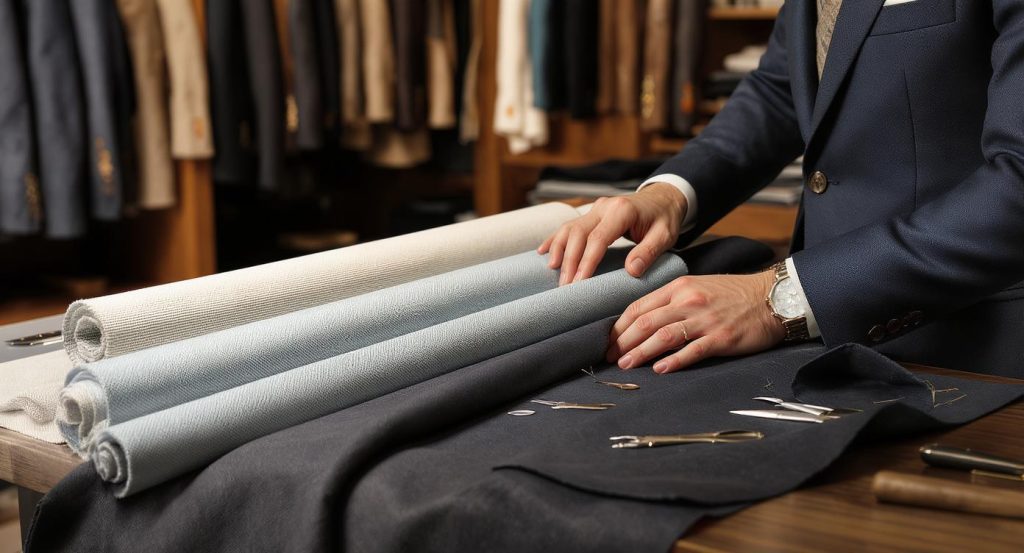
Italian fabrics play a central role in global suiting because of their unmatched quality, timeless style, and deep-rooted heritage in craftsmanship. From bespoke suits made with superfine wool to fabric blends tailored for every climate, Italian textiles have become the benchmark for premium menswear around the world. If you’re wondering what fabric suits are made of and why Italian bespoke suits stand apart, this guide has you covered.
Whether you’re a fashion retailer, a custom tailor, or just curious about luxury suits, this article will show you what makes Italian fabric unique. You’ll learn how it influences global suiting and why ‘Made in Italy’ still matters.
Italian fabric is more than material—it’s a product of centuries of textile innovation and design. From Biella to Milan, Italy is home to renowned mills like Loro Piana, Vitale Barberis Canonico, and Ermenegildo Zegna, each known for producing world-class wool, silk, and cashmere blends.
These manufacturers don’t just make fabric—they create art. Italian suit fabric is famous for its softness, drape, and durability. The aesthetic is often sleek and refined, with a modern edge that appeals to both classic and fashion-forward customers.
So, what fabric are suits made of when they’re Italian?
These natural materials are carefully sourced from top wool-producing countries like Australia and New Zealand, then refined through Italy’s traditional yet innovative weaving processes.
Italian mills constantly push boundaries with technology and design. For example, Zegna’s Trofeo Wool and Loro Piana’s Rain System fabric showcase how Italian textiles blend performance with elegance. Whether it’s a lightweight summer blend or a water-repellent business suit, Italy leads the way in innovation.
Compared to English fabrics that are heavier and more structured, Italian suit fabrics are lighter and more breathable, making them ideal for both comfort and mobility. That’s why Italian bespoke suits often feel more like a second skin than a stiff uniform.
This makes Italian fabric the go-to choice for global designers looking to offer versatile, all-day-wear suiting.

Italian bespoke suits are fully customized to the client’s body and preferences. Unlike off-the-rack options, these suits begin with selecting the perfect Italian fabric—often worsted wool or a silk blend—followed by multiple fittings. The result is a suit with perfect structure, breathability, and drape.
Each Italian bespoke suit reflects not just luxury but also identity—an unspoken symbol of taste, status, and sophistication.
Tailors from New York to Tokyo source Italian fabrics for custom orders because they know clients demand the best. Italian fabric sets the global benchmark for durability, texture, and versatility, making it the first choice in both high fashion and classic tailoring.

If you’ve ever wondered “what are suits made of,” especially high-end ones, here are the key takeaways:
Unlike bulk fabrics, Italian textiles are woven in smaller batches, often on shuttle looms, allowing for precision and richer weaves. That’s why you rarely find a quality Italian fabric that pills, fades, or wears thin quickly.
Many mistake “suits in Italian” for a literal translation. But in the tailoring world, it speaks to an entire lifestyle. Italian suits mean flair, comfort, and subtle confidence. A true Italian bespoke suit doesn’t just fit—it moves with you, breathes with you, and lasts for years.
Mostly wool, especially Super 100s to 180s. Other options include silk, cashmere, linen, and cotton.
They use superior Italian textiles, lightweight construction, and personalized tailoring techniques.
Yes. Lightweight blends like linen or wool-silk are breathable and perfect for warm climates.
It combines high-quality fibers with expert craftsmanship and innovative weaving methods.
The word for suits in Italian is “abiti” or “completi da uomo,” often used in fashion contexts.
Italian bespoke suits are more than elegant—they’re engineered for comfort, durability, and self-expression. From the feel of superfine wool to the rich history woven into every thread, Italian fabric continues to define what quality suiting looks like.
If you’re ready to elevate your wardrobe, trust in the craftsmanship that global tailors and fashion houses rely on. Explore the Baoxiniao collection of Italian bespoke suits and fabrics today and discover timeless quality, one suit at a time.